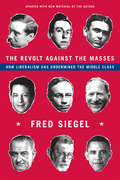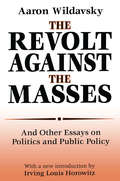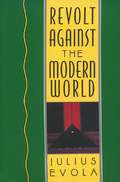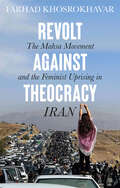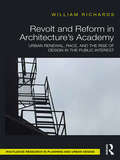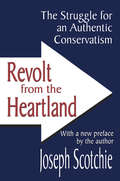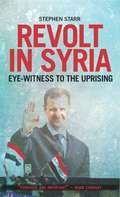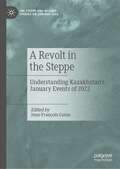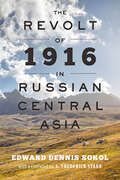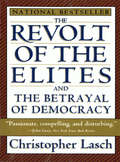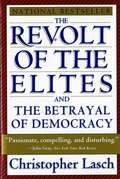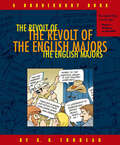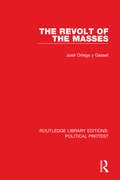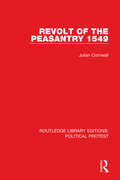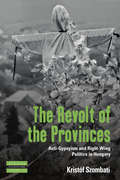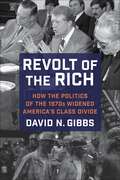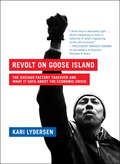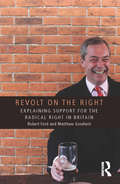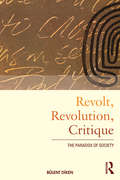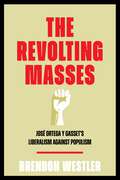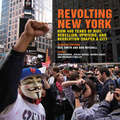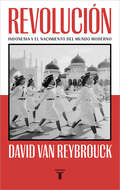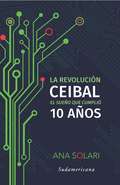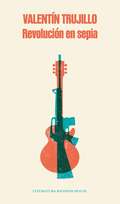- Table View
- List View
The Revolt Against the Masses
by Fred SiegelThis short book rewrites the history of modern American liberalism. It shows that what we think of liberalism today-the top-and-bottom coalition we associate with President Obama-began not with Progressivism or the New Deal but rather in the wake of the post-WWI disillusionment with American society. In the Twenties, the first writers and thinkers to call themselves liberals adopted the hostility to bourgeois life that had long characterized European intellectuals of both the left and the right. The aim of liberalism's founding writers and thinkers-such as Herbert Croly, Randolph Bourne, H.G. Wells, Sinclair Lewis, and H.L Mencken-was to create an American aristocracy of sorts, to provide the sense of hierarchy and order that had long been associated with European statism.Like communism, Fabianism, and fascism, modern liberalism was born of a new class of politically self-conscious intellectuals. Critical of mass democracy and middle-class capitalism, liberals despised the individual businessman's pursuit of profit as well as the conventional individual's pursuit of pleasure, both of which were made possible by the lineaments of the limited nineteenth-century state.Temporarily waylaid by the heroism of the WWII generation, liberalism expressed itself in the 1950s as a critique of popular culture. It was precisely the success of a recently elevated middle-class culture that frightened foppish characters such as Dwight Macdonald and Aldous Huxley, crucial influences on what was mistakenly called the New Left. There was no New Left in the 1960s, but there was a New Class that in the midst of Vietnam and race riots took up the priestly task of de-democratizing America in the name of administering newly developed rightsThe neo-Malthusianism that emerged from the 1960s did not aim to control the breeding habits of the lower classes, as its eugenicist precursors had done, but to mock and restrain the buying habits of the middle class.Today's Barack Obama brand of liberalism has displaced the old Main Street private-sector middle class with a new middle class composed of public-sector workers allied with crony capitalists and the country's arbiters of style and taste.
The Revolt Against the Masses: And Other Essays on Politics and Public Policy
by Aaron WildavskyThe author of this stunning set of essays on politics and public policy makes crystal clear the meaning of the title. "The revolutionaries of contemporary America do not seek to redistribute privilege from those who have it to those who do not. These radicals wish to arrange a transfer of power from those elites who now exercise it to another elite, namely themselves, who do not. This aspiring elite is of the same race (white), the same class (upper middle and upper), and the same educational background (the best colleges and universities) as those they wish to displace." Wildavsky's bracing work takes a close look at these elites, who probably make up little more than one percent of the population. He sees their common denominator as hostility toward the masses, anti-American attitudes, derision of authority, and a belief in participatory rather than representative politics. The author carries through these themes in a variety of essays on black-white racial relations, social work orientations and black militancy, the politics of budgetary reform, elite and mass trends in the political party system, and the substitution of bureaucratic for democratic modes of advancing the policy process. This work is, in short, vintage Wildavsky: tough minded, spirited, and plain-spoken political analysis. In his new Introduction, Irving Louis Horowitz examines what has changed and what continues to be salient in Wildavsky's line of analysis. Essentially, the report card on The Revolt Against the Masses is that the situation described in these essays has changed somewhat in style but hardly at all in substance. The nuclear shield replaces the ABM treaty, and Afghanistan replaces Vietnam as centers of political gravity-but the same coalition of forces across party and economy still dominate the American political process. The justifiably famous essay on "The Two Presidencies" shows how persistent is the gap between the conflict over domestic priorities and the consensus on foreign policy-and why. This is, in short, a classic text that continues to merit careful study by all those interested in political life. Aaron Wildavsky was, until his death in 1993, professor of political science and public policy at the University of California in Berkeley. He was also director of its Survey Research Center. He served as director of the Russell-Sage Foundation, was a president of the American Political Science Association, and held a number of visiting professorships during his lifetime. Most recently, Transaction has posthumously published Wildavsky's complete essays and papers in five volumes. Irving Louis Horowitz is Hannah Arendt distinguished university professor emeritus at Rutgers, The State University, and longtime friend and associate of Aaron Wildavsky.
Revolt Against the Modern World: Politics, Religion, and Social Order in the Kali Yuga
by Julius EvolaWith unflinching gaze and uncompromising intensity Julius Evola analyzes the spiritual and cultural malaise at the heart of Western civilization and all that passes for progress in the modern world. As a gadfly, Evola spares no one and nothing in his survey of what we have lost and where we are headed. At turns prophetic and provocative, Revolt against the Modern World outlines a profound metaphysics of history and demonstrates how and why we have lost contact with the transcendent dimension of being. The revolt advocated by Evola does not resemble the familiar protests of either liberals or conservatives. His criticisms are not limited to exposing the mindless nature of consumerism, the march of progress, the rise of technocracy, or the dominance of unalloyed individualism, although these and other subjects come under his scrutiny. Rather, he attempts to trace in space and time the remote causes and processes that have exercised corrosive influence on what he considers to be the higher values, ideals, beliefs, and codes of conduct--the world of Tradition--that are at the foundation of Western civilization and described in the myths and sacred literature of the Indo‑Europeans. Agreeing with the Hindu philosophers that history is the movement of huge cycles and that we are now in the Kali Yuga, the age of dissolution and decadence, Evola finds revolt to be the only logical response for those who oppose the materialism and ritualized meaninglessness of life in the twentieth century. Through a sweeping study of the structures, myths, beliefs, and spiritual traditions of the major Western civilizations, the author compares the characteristics of the modern world with those of traditional societies. The domains explored include politics, law, the rise and fall of empires, the history of the Church, the doctrine of the two natures, life and death, social institutions and the caste system, the limits of racial theories, capitalism and communism, relations between the sexes, and the meaning of warriorhood. At every turn Evola challenges the reader’s most cherished assumptions about fundamental aspects of modern life. A controversial scholar, philosopher, and social thinker, JULIUS EVOLA (1898-1974) has only recently become known to more than a handful of English‑speaking readers. An authority on the world’s esoteric traditions, Evola wrote extensively on ancient civilizations and the world of Tradition in both East and West. Other books by Evola published by Inner Traditions include Eros and the Mysteries of Love, The Yoga of Power, The Hermetic Tradition, and The Doctrine of Awakening.
Revolt Against Theocracy: The Mahsa Movement and the Feminist Uprising in Iran
by Farhad KhosrokhavarThis book is the first in-depth account of the uprising in Iran that began on 16 September 2022, when a young woman, Mahsa Amini, was killed by the morality police. In the months that followed, protests and demonstrations erupted across Iran, representing the most serious challenge to the Iranian regime in decades. Women have played a key role in these protests, refusing to wear a hijab and cutting their hair in public to chants of ‘Woman, Life, Freedom’. In Farhad Khosrokhavar’s account, these protests represent the first truly feminist movement in Iran, and one of the first in the Muslim world, where women have been in the vanguard. There have been many movements in the Muslim world in which women have taken part, but rarely have women – and especially young women – been the driving force. The Mahsa Movement also championed non-Islamic, secularized values, based on the joy of living, the assertion of bodily freedom and the quest for gender equality and democracy. Khosrokhavar gives a full account of the context of and background to the events triggered by the killing of Mahsa Amini, analyzes the character of the Mahsa Movement and the regime’s repressive response to it, and draws out its broader significance as one of the most significant feminist movements and political uprisings in the Islamic world.
Revolt and Reform in Architecture's Academy: Urban Renewal, Race, and the Rise of Design in the Public Interest
by William RichardsRevolt and Reform in Architecture’s Academy uniquely addresses the complicated relationship between architectural education and urban renewal in the 1960s, which paved the way for what is today known as public interest design. Through an examination of curricular reforms at Columbia University’s and Yale University’s schools of architecture in the 1960s, this book translates the "urban crisis" through the experiences of two influential groups of architecture students, as well as their contributions to design’s lexicon. The book argues that urban renewal and campus expansion half a century ago recast architectural education at two schools whose host cities, New York and New Haven, were critical sites for political, social, and urban upheaval in America. The urban challenges of that time are the same challenges rapidly growing cities face today—access, equity, housing, and services. As architects, architects in training, and architecture students continue to wrestle with questions surrounding how design may serve a broadly defined public interest, this book is a timely assessment of the forces that have shaped the debate.
Revolt from the Heartland: The Struggle for an Authentic Conservatism
by Joseph A. ScotchieThe dominant forces of American conservatism remain wedded, at all costs, to the Republican Party, but another movement, one with its roots in the pre-World War II era, has stepped forth to fill an intellectual vacuum on the right. This Old Right first rose in opposition to the New Deal, fighting both statism at home and the emergence of an American empire abroad. More recently this movement, sometimes called paleoconservatism, has provided the ideological backbone of modern populism and the opposition to globalization, with decisive effects on presidential politics. In Revolt from the Heartland, Joseph Scotchie provides an intellectual history of the Old Right, treating its main figures and defining its conflict with the traditional left-right political mainstream.As Scotchie's account makes clear, the Old Right and its descendents have articulated an arresting and powerful worldview. They include an array of learned and provocative writers, including M.E. Bradford, Russell Kirk, Richard Weaver, and Murray Rothbard, and more recently, Clyde Wilson, Thomas Fleming, Samuel Francis, and Chilton Williamson, Jr. Beginning with the movement's anti-Federalist forerunners, Scotchie traces its developments over two centuries of American history. In the realm of politics and economics, he examines the anti-imperialist stance against the Spanish-American War and the League of Nations, the split among conservatives on Cold War foreign policy, and the hostility to the socialist orientation of the New Deal. Identifying a number of social and cultural attitudes that define the Old Right, Scotchie finds the most important to be the importance of the classics, a recognition of regional cultures, the primacy of family over state, the moral case against immigration. In general, too, a Tenth Amendment approach to such recurring issues as education, abortion, and school prayer characterizes the group.As Scotchie makes clear, the Old Right and its grass-roots supporters have, and continue to be, a powerful force in modern American politics in spite of a lack of institutional support and media recognition. Revolt from the Heartland is an important study of a persisting current in American political life.
Revolt in Syria: Eye-witness to the Uprising
by Stephen StarrIn Revolt, Stephen Starr delves deep into the lives of those affected by the Syrian state over the past five decades. Interviewing people from all levels of society, Starr gathers and interprets the views and beliefs that illustrate why Syria, with its numerous sects and religious diversity, has been so prone to violence and civil instability.
A Revolt in the Steppe: Understanding Kazakhstan’s January Events of 2022 (The Steppe and Beyond: Studies on Central Asia)
by Jean-François CaronThis book explores the various ramifications and consequences of the violent civil protests that affected Kazakhstan in January 2022. In this compelling study, the authors examine the underlying social and political tensions that have affected this biggest country of Central Asia, especially since its political transition of 2019 and how the state has managed to justify its actions that led to a return to peace. It also puts in perspective this event in the wider transition affecting Eurasia with the war in Ukraine and how this shift of world politics may impact Kazakhstan that required the support of Russia and the other members of the Collective Security Treaty Organization during these protests. This book will be of value for scholars, journalists and NGOs working on authoritarianism and on Central Asia.
The Revolt of 1916 in Russian Central Asia (The Johns Hopkins University Studies in Historical and Political Science #71)
by Edward Dennis SokolThe definitive study of a nearly forgotten genocide, reissued with a new foreword.During the summer of 1916, approximately 270,000 Central Asians—Kazakhs, Kyrgyz, Tajiks, Turkmen, and Uzbeks—perished at the hands of the Russian army in a revolt that began with resistance to the Tsar’s World War I draft. In addition to those killed outright, tens of thousands of men, women, and children died while trying to escape over treacherous mountain passes into China. Experts calculate that the Kyrgyz, who suffered most heavily, lost 40% of their total population. This horrific incident was nearly lost to history. During the Soviet era, the massacre of 1916 became a taboo subject, hidden in sealed archives and banished from history books. Edward Dennis Sokol’s pioneering Revolt of 1916 in Russian Central Asia, published in 1954 and reissued now for the first time in decades, was for generations the only scholarly study of the massacre in any language. Drawing on early Soviet periodicals, including Krasnyi Arkhiv (The Red Archive), Sokol’s wide-ranging and exhaustively researched work explores the Tsarist policies that led to Russian encroachment against the land and rights of the indigenous Central Asian people. It describes the corruption that permeated Russian colonial rule and argues that the uprising was no mere draft riot, but a revolt against Tsarist colonialism in all its dimensions: economic, political, religious, and national. Sokol’s masterpiece also traces the chain reaction between the uprising, the collapse of Tsarism, and the Bolshevik Revolution. A classic study of a vanished world, Sokol's work takes on contemporary resonance in light of Vladimir Putin’s heavy-handed efforts to persuade Kyrgyzstan to join his new economic union. Sokol explains how an earlier Russian conquest ended in disaster and implies that a modern conquest might have the same effect. Essential reading for historians, political scientists, and policymakers, this reissued edition is being published to coincide with the centennial observation of the genocide.
The Revolt of the Elites and the Betrayal of Democracy
by Christopher Lasch"[A] passionate, compelling, and disturbing argument that the ills of democracy in the United States today arise from the default of its elites." —John Gray, New York Times Book Review (front-page review) In a front-page review in the Washington Post Book World, John Judis wrote: "Political analysts have been poring over exit polls and precinct-level votes to gauge the meaning of last November's election, but they would probably better employ their time reading the late Christopher Lasch's book." And in the National Review, Robert Bork says The Revolt of the Elites "ranges provocatively [and] insightfully." Controversy has raged around Lasch's targeted attack on the elites, their loss of moral values, and their abandonment of the middle class and poor, for he sets up the media and educational institutions as a large source of the problem. In this spirited work, Lasch calls out for a return to community, schools that teach history not self-esteem, and a return to morality and even the teachings of religion. He does this in a nonpartisan manner, looking to the lessons of American history, and castigating those in power for the ever-widening gap between the economic classes, which has created a crisis in American society. The Revolt of the Elites and the Betrayal of Democracy is riveting social commentary.
Revolt of the Elites and the Betrayal of Democracy
by Christopher LaschIn a front-page review in the Washington Post Book World, John Judis wrote: "Political analysts have been poring over exit polls and precinct-level votes to gauge the meaning of last November's election, but they would probably better employ their time reading the late Christopher Lasch's book."
The Revolt of the English Majors: A Doonesbury Book
by G. B. TrudeauThis anthology from the acclaimed comic strip delves into the weirdness of America as it enters the twenty-first century, dot com, Dubya, and all.Even challenging George “Dubya” Bush to a “pronunciation bee” can't save Uncle Duke's weird horse race for the White House. In the end, the former Ambassador passes out in a snowbank while the Cheney Administration kicks into high gear. Predictablistically, the new presidential syntax isn't the only thing that's tortured and strange. Take myvulture.com, an Internet company born and born-again, worth $1 million or $500, depending on whether you ask the CEO or his mother; or look at Joanie Caucus as the turnover in Washington casts her career into play, if not into midlife crisis; or consider J.J. and Zeke, whose pay-per-view, online wedding yields mucho buzz but zero bucks—just like the rest of the Net. Yes, it's a Dubya Dubya Dubya world. Doonesbury just downloads it.
The Revolt of the English Majors: A Doonesbury Book (Doonesbury Ser. #21)
by G. B. TrudeauThis anthology from the acclaimed comic strip delves into the weirdness of America as it enters the twenty-first century, dot com, Dubya, and all.Even challenging George “Dubya” Bush to a “pronunciation bee” can't save Uncle Duke's weird horse race for the White House. In the end, the former Ambassador passes out in a snowbank while the Cheney Administration kicks into high gear. Predictablistically, the new presidential syntax isn't the only thing that's tortured and strange. Take myvulture.com, an Internet company born and born-again, worth $1 million or $500, depending on whether you ask the CEO or his mother; or look at Joanie Caucus as the turnover in Washington casts her career into play, if not into midlife crisis; or consider J.J. and Zeke, whose pay-per-view, online wedding yields mucho buzz but zero bucks—just like the rest of the Net. Yes, it's a Dubya Dubya Dubya world. Doonesbury just downloads it.
The Revolt of the Masses (Routledge Library Editions: Political Protest #21)
by José Ortega y GassetThis book, first published in 1930 and reissued in 1961, examines the Western phenomenon of the rise of the ‘mass-man’. Analysing the state of society before the Second World War, acclaimed philosopher Ortega y Gasset lays bare the problems that faced the countries of Europe in a book that resonates today in the imposition of direct action over discussion.
Revolt of the Peasantry 1549 (Routledge Library Editions: Political Protest #22)
by Julian CornwallThis book, first published in 1977, looks at the two peasant revolts that occurred in 1549, in the troubled period following the death of Henry VIII. The uprisings reveal a harsh background of economic and social injustice, intensified at the time by inflation. Peasants in North Devon rose against the imposition of the English Prayer Book, and with the local authorities paralysed and the government wavering between conciliation and repression, a general rebellion broke out. Reinforced by Cornishmen, rallying to the defence of their national identity, the peasants assembled a formidable army and laid siege to Exeter itself. Only after three major battles was the revolt suppressed. The Norfolk peasants rose against agrarian abuses, routing a small royal force and occupying Norwich. Ably led by Robert Kett, they expelled the gentry and governed the county on a programme of social justice until they were crushed by the forces released by the collapse of the other risings. These revolts display the deep-seated resentments and injustices felt by the peasantry of the sixteenth century.
The Revolt of the Provinces: Anti-Gypsyism and Right-Wing Politics in Hungary (Dislocations #23)
by Kristóf SzombatiThe first in-depth ethnographic monograph on the New Right in Central and Eastern Europe, The Revolt of the Provinces explores the making of right-wing hegemony in Hungary over the last decade. It explains the spread of racist sensibilities in depressed rural areas, shows how activists, intellectuals and politicians took advantage of popular racism to empower right-wing agendas and examines the new ruling party's success in stabilizing an 'illiberal regime'. To illuminate these important dynamics, the author proposes an innovative multi-scalar and relational framework, focusing on interaction between social antagonisms emerging on the local level and struggles waged within the political public sphere.
Revolt of the Rich: How the Politics of the 1970s Widened America's Class Divide
by David GibbsInequality in the United States has reached staggering proportions, with a massive share of wealth held by the very richest. How was such a dramatic shift in favor of a narrow elite possible in a democratic society? David N. Gibbs explores the forces that shaped the turn toward free market economics and wealth concentration and finds their roots in the 1970s. He argues that the political transformations of this period resulted from a “revolt of the rich,” whose defense of their class interests came at the expense of the American public.Drawing on extensive archival research, Gibbs examines how elites established broad coalitions that brought together business conservatives, social traditionalists, and militarists. At the very top, Richard Nixon’s administration quietly urged corporate executives to fund conservative think tanks and seeded federal agencies with free-market economists. Even Jimmy Carter’s ostensibly liberal administration brought deregulation to the financial sector along with the imposition of severe austerity measures that hurt the living standards of the working class. Through a potent influence campaign, academics and intellectuals sold laissez-faire to policy makers and the public, justifying choices to deregulate industry, cut social spending, curb organized labor, and offshore jobs, alongside expanding military interventions overseas.Shedding new light on the political alliances and policy decisions that tilted the playing field toward the ultrawealthy, Revolt of the Rich unveils the origins of today’s stark disparities.
Revolt on Goose Island
by Kari LydersenRevised and updated, with a new afterword by the author"There is much talk about 'audacity' these days, but true chutzpah is when the workers take over the factory and take on the bank. Kari Lydersen's invaluable account of the Republic sit-down strike is an instruction manual for worker dignity."--Mike Davis, author of Buda's Wagon and City of QuartzDecember 5, 2008: It wasn't supposed to work like this. Days after getting a $45 billion bailout from the U.S. government, Bank of America shut down a line of credit that kept Chicago's Republic Windows & Doors factory operating. The bosses, who knew what was coming, had been sneaking machinery out in the middle of the night. They closed the factory and sent the workers home.Then something surprising happened: Republic's workers occupied the factory and refused to leave.Kari Lydersen, an award-winning reporter, tells the story of the factory takeover, elegantly transforming the workers' story into a parable of labor activism for the twenty-first century, one that concludes with a surprising and little-reported victory.From the Trade Paperback edition.
Revolt on the Right: Explaining Support for the Radical Right in Britain (Extremism and Democracy)
by Robert Ford Matthew J GoodwinWinner of the Political Book of the Year Award 2015 The UK Independence Party (UKIP) is the most significant new party in British politics for a generation. In recent years UKIP and their charismatic leader Nigel Farage have captivated British politics, media and voters. Yet both the party and the roots of its support remain poorly understood. Where has this political revolt come from? Who is supporting them, and why? How are UKIP attempting to win over voters? And how far can their insurgency against the main parties go? Drawing on a wealth of new data – from surveys of UKIP voters to extensive interviews with party insiders – in this book prominent political scientists Robert Ford and Matthew Goodwin put UKIP's revolt under the microscope and show how many conventional wisdoms about the party and the radical right are wrong. Along the way they provide unprecedented insight into this new revolt, and deliver some crucial messages for those with an interest in the state of British politics, the radical right in Europe and political behaviour more generally.
Revolt, Revolution, Critique: The Paradox of Society (International Library of Sociology)
by Bulent DikenIn contemporary society the idea of ‘revolution’ seems to have become obsolete. What is more untimely than the idea of revolution today? At the same time, however, the idea of radical change no longer refers to exceptional circumstances but has become normalized as part of daily life. Ours is a ‘culture’ of permanent revolution in which constant systemic disembedding demands a meta-stable subjectivity in continuous transformation. In this sense, the idea of revolution is painfully timely. This paradoxical coincidence, the simultaneous absence and presence of the desire for radical change in contemporary society, is the point of departure for the symptomatic reading this book offers. The book addresses the social, political and cultural significance of revolt and revolution in three dimensions. First, it analyzes revolt and revolution as ‘events’ which are of history but not reducible to it. Second, it elaborates on theories that grant revolt and revolution a central place in their structure. Thirdly, it discusses revolutionary or emancipatory theories that seek to participate in radical change. Further, since both revolt and revolution involve the critique of what exists, of actual reality, the implications of the intimate relationship between revolt, revolution and critique are explicated.
The Revolting Masses: José Ortega y Gasset’s Liberalism Against Populism
by Brendon WestlerJosé Ortega y Gasset (1883–1955) was a Spanish philosopher and essayist best known for The Revolt of the Masses, first translated into English in 1932. In it, Ortega critiques a populist deformation of democracy by the rise of a “mass mentality” characterized by selfishness, a lack of curiosity, and a general indifference to the opinions and attitudes of others. However, as Brendon Westler makes clear, we need to look beyond Ortega’s arguments about populism and democracy in his most famous work to recover the philosopher’s expansive political outlook and to identify his valuable contributions to the history and advancement of liberalism.Westler’s book reconstructs Ortega’s political theory, underscoring its distinctive historical origins as well as the ways in which it might be instructive to us today. Through an exploration of works less familiar to an English-speaking audience, such as Concord and Liberty, “Vieja y nueva política,” “De Europa meditatio Quaedam,” and “Democracia morbosa,” combined with a sensitivity to larger social and political ideas circulating within Spain, The Revolting Masses traces the contours of Ortega’s approach to politics. Westler argues that reading texts written over the course of the philosopher’s entire career, in combination with The Revolt of the Masses, offers a more complete picture of Ortega’s political thought—one that advocates for a liberal ethos as an answer to populism and promotes both individual freedom and the preservation of community bonds.As The Revolting Masses shows, Ortega was, above all, a philosopher who reflected on what it would take for people of differing beliefs to live together. His unique conception of liberalism, grounded in the Spanish tradition, not only emphasizes pluralism and diversity of thought and institutions but also serves as a potential antidote to the populism of our present moment.
Revolting New York: How 400 Years of Riot, Rebellion, Uprising, and Revolution Shaped a City (Geographies of Justice and Social Transformation #38)
by Neil Smith and Don MitchellA comprehensive guide to New York City&’s historical geography of social and political movements. Occupy Wall Street did not come from nowhere. It was part of a long history of uprising that has shaped New York City. From the earliest European colonization to the present, New Yorkers have been revolting. Hard hitting, revealing, and insightful, Revolting New York tells the story of New York&’s evolution through revolution, a story of near-continuous popular (and sometimes not-so-popular) uprising. Richly illustrated with more than ninety historical and contemporary images, historical maps, and maps drawn especially for the book, Revolting New York provides the first comprehensive account of the historical geography of revolt in New York, from the earliest uprisings of the Munsee against the Dutch occupation of Manhattan in the seventeenth century to the Black Lives Matter movement and the unrest of the Trump era. Through this rich narrative, editors Neil Smith and Don Mitchell reveal a continuous, if varied and punctuated, history of rebellion in New York that is as vital as the more standard histories of formal politics, planning, economic growth, and restructuring that largely define our consciousness of New York&’s story.Contributors: Marnie Brady, Kathleen Dunn, Zultán Gluck, Rachel Goffe, Harmony Goldberg, Amanda Huron, Malav Kanuga, Esteban Kelly, Manissa McCleave Maharawal, Don Mitchell, Justin Sean Myers, Brendan P. O&’Malley, Raymond Pettit, Miguelina Rodriguez, Jenjoy Roybal, McNair Scott, Erin Siodmak, Neil Smith, Peter Waldman, and Nicole Watson.&“The writing is first-rate, with ample illustrations and many contemporary and historical images. Fast paced and fascinating, like the city it profiles.&”—Library Journal
Revolución: Indonesia y el nacimiento del mundo moderno
by David Van ReybrouckUna perspicaz reconstrucción de la descolonización de Indonesia,un proceso de alcance e interés mundial. Durante mucho tiempo se ha considerado que la lucha por la independencia de Indonesia, cuyo punto álgido se situó en la década de 1940, fue un conflicto aislado entre la potencia colonial, los Países Bajos, y las colonizadas Indias Orientales Holandesas. El relato que hay detrás es, sin embargo, un impresionante reflejo de la historia mundial. Indonesia fue el primer país en declarar su independencia tras la Segunda Guerra Mundial -pese a la oposición de las tropas británicas, australianas y, sobre todo, neerlandesas- e inspiró movimientos independentistas en Asia, África y el mundo árabe, especialmente al organizar la legendaria Conferencia de Bandung en 1955, la primera conferencia internacional sin Occidente. Con su habitual estilo conmovedor y comprometido, David van Reybrouck ha reconstruido un relato para la historia. Tras entrevistar a casi doscientas personas -los últimos testigos vivos de la revolución- en hogares de ancianos en Indonesia, megaciudades japonesas y e islas lejanas, entreteje una ingente cantidad de recuerdos para explorar de manera reveladora la apasionante crónica de la conquista de la Libertad. Críticas:«Monumental. Un libro cuya fuerza, a medida que pasan sus páginas, no hace más que aumentar».De Standaard, periódico «David Van Reybrouck ama la historia oral y la historia oral le ama a él».De Volkskrant, periódico «Una buena investigación, fantástica, un placer para la vista».Gert Oostindie, historiador «Las entrevistas con testigos presenciales y el uso de diarios personales nunca estudiados constituyen un aspecto importante de Revolusi. Van Reybrouck los ha entretejido casi a la perfección en su historia sobre la lucha por la independencia de Indonesia».Nederlands Dagblad, periódico «Sumándose a los muchos libros y documentales sobre las Indias Orientales Holandesas e Indonesia que ya existen, Van Reybrouck sitúa las ambiciones de Indonesia, como primera colonia en declarar la independencia tras la Segunda Guerra Mundial, dentro de una perspectiva más amplia».Algemeen Dagblad, periódico Sobre Congo se dijo:«¡Olvídate de todos los estereotipos sobre África y lee Congo!».Roberto Saviano «Un relato palpitante que se revela también como un extraño espejo en el que mirarnos».Le Monde «Magnífico. Esencial para interesados en cómo el pasado reciente influye en nuestro futuro. De una lucidez excepcional».The New York Times Book Review «La investigación, la pasión y la originalidad en la escritura de Van Reybrouck son un don. No solo es épico, también es una obra maestra».The Independent
La revolución Ceibal: El sueño que cumplió 10 años
by Ana SolariEn 1824 Carlos Federico Lecor, Vizconde de la Laguna, procura imponer elorden en la recién creada Provincia Cisplatina, sin poder imaginar quecaerá víctima del embrujo de una hermosa y enigmática gitana quien lerobará el corazón. Todos oímos hablar del Plan Ceibal y es un hecho que las ya famosas ceibalitas tiñeron el paisaje cotidiano uruguayo en los últimos años. Con críticas y múltiples lagos, a nadie resultaindiferente, tampoco a referentes internacionales que han puesto lupa en esta experiencia que comenzó con el emblema un niño, una computadora. Pero ¿de qué se trata realmente? ¿Cuáles eran sus objetivos y a dónde ha llegado? ¿Cambió el mapa educativo del país o es un artificio? ¿Cuánto ha mitigado la llamada brecha digital? ¿Quiénes son sus aliados y cuáles sus resistencias? ¿Cómo ha sido su desarrollo y hacia dónde se dirige ahora? Es un hecho que el Plan Ceibal trasciende largamente el reparto de máquinas. Por eso, a diez años de su creación, la escritora Ana Solari realizó una investigación periodística que pasa raya a su influencia en los centros educativos y, en definitiva, sobre la comunidad, por medio de reportajes que recoge en primera persona, cara a cara con los actores: alumnos, docentes y mentores. Un abordaje «sobre el terreno» de esta «experiencia transformadora del enfoque pedagógico en Uruguay a través de la tecnología».Ceibal apoya esta iniciativa periodística que es una entre muchas posibles, en el empeño de dar a conocer su labor en permanente cambio.
Revolución en sepia
by Valentin TrujilloCon mirada inteligente e irónica, esta novela se plantea una realidad posible, alternativa, que habilita a la relectura de los confusos hechos que conmovieron al Río de la Plata bajo el fuego espiritual de una década candente. Montevideo, finales de los años sesenta. Mariano es el hijo acomodado de un ministro del gobierno y su futuro parece asegurado, pero su única obsesión es la música que está revolucionando el mundo a partir de los Beatles. Toca la guitarra, compone sus canciones y las canta en un grupo llamado Los Shepards. La incorporación a la banda de Alberto termina de delinear una dupla interpretativa imbatible,que parece destinada al éxito. Pero su rol en Los Shepards es la fachada de intenciones secretas, que se conectan con los movimientos clandestinos. Sin embargo, al comenzar los ensayos con la banda y reforzar sus vínculos con Mariano, Alberto se enfrentará a la disyuntiva espiritual entre el arte y la revolución; dos versiones del mismo afán. Enfrentado a la decisión entre cambiar el mundo con las armas o con la guitarra, la situación dará un vuelco inesperado, desbaratando los planes originales y conduciendo la trama hacia un escenario delirante e impredecible. Con mirada inteligente e irónica, esta novela se plantea una realidad posible, alternativa, que habilita a la relectura de los confusos hechos que conmovieron al Río de la Plata bajo el fuego espiritual de una década candente.
